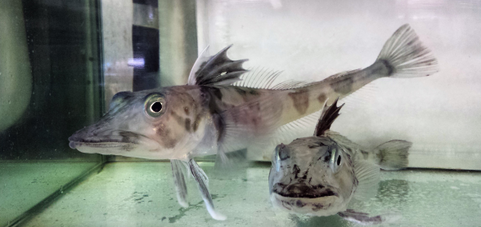
SPOTLIGHT: Research Unit of Environmental physiology and experimental zoology
Pubblicato il: 20.03.2020 12:00
The Research Unit of Environmental physiology and experimental zoology has devoted years to research in the field of environmental science, having a background of experiences and expertise, which have been formed through many participations to national and international research programs, since the early years eighty. Currently, the Unit Research activities can be declined in four main topics, including the education in Life Sciences.
STUDY OF DAMAGE MECHANISMS, PHYSIOLOGICAL, BIOCHEMICAL AND CYTOLOGICAL RESPONSES AND SPECIFIC PATHWAYS OF DETOXIFICATION IN MARINE AND TERRESTRIAL INVERTEBRATES EXPOSED TO XENOBIOTICS
In this field, The Research Unit published many studies focused on the physiological responses of Mediterranean invertebrates (mainly bivalve molluscs and tunicates)to metal exposure, demonstrating the involvement of various proteins in detoxification ability of these animals.
More recently, a collaboration with the Veneto Region, the Agenzia Regionale per la Prevenzione e Protezione Ambientale del Veneto (ARPAV), the Italian National Institute of Health and other Italian research institutions has been established for the European Commission LIFE project “PHOENIX - Perfluorinated compounds Holistic Environmental Interistitutional eXperience” (Life16/ENV/IT/000488) on monitoring and integrated management of environmental resources of the Veneto Region in relation to the problem of per- and poly-fluoroalkyl substance (PFAS) pollution.
STRUCTURAL AND FUNCTIONAL STUDIES, IN ENVIRONMENTAL AND EVOLUTIONARY PERSPECTIVE, OF PHYSIOLOGICAL ANTIOXIDANT DEFENSE SYSTEMS
In various organisms, such as Antarctic fish and mollusks, tunicates, insects and ciliated protozoa, the Research Unit structurally and functionally characterized a variety of proteins involved in the cellular defence against the risk of oxidative stress.
In particular, as part of the Antarctic National Research Program (PNRA), three research proposals that include this topic were recently funded: “How key components of the coastal Antarctic food web respond to global change: an omic approach” (PNRA16_00099), “Journey to the cold and back : comparative genomics and transcriptomics in Antarctic and sub-Antarctic notothenioids” (PNRA16_00226) and AntaGPS - Antarctica as a global pollution sensor: aquatic and terrestrial organisms as bio-indicators and meta-analysis of pollutant trends” (PNRA18_00133). They aim to perform studies concerning the peculiar metabolic characteristics of Antarctic organisms and biological responses to environmental contamination and climate change. These projects are the result of collaborations with Italian and foreign research institutions.
BIOGEOGRAPHY AND BIODIVERSITY.
An important part of the Research Unit research focuses on problems related to habitat conservation, until arrive at an objective assessment of value of the sites, using environmental quality indexes such as the “Biodiversity Friend”. After the funding of two projects by the European Social Fund “BfB - Bees for Biodiversity” (2105-122-2216-2016) and “ATIRA – Advanced Tools to Increase the Resilience of Agroecosystems” (2105-0052-1463-2019), focused on biodiversity protection and territory promotion, the study of environment is also seen in view to ensure sustainability, productivity of economic systems, protection and conservation of natural resources. The projects were addressed to the training/updating of local producers and aimed at the creation of specific expertises, such as naturalists/biologists, able to apply synthetic methods of evaluation of environmental quality, and marketing expert territorial animators, able to spread among territory economic operators the awareness that environmental quality and biodiversity, may represent strong elements in recognition of territory typicality and, therefore, an economic value.
DIDACTIC RESEARCH, DISSEMINATION AND EDUCATION IN LIFE SCIENCES.
In recent years, the Research Unit also performs some researches in order to introduce into the Italian school innovative methodological approaches and contents, related to the didactics of biology. Educational activities of comparative anatomy, evolution, biotechnology, botany, cytology, ecology, nutritional education, physiology, immunology, genetics, microbiology and zoology have been designed and successfully implemented in kindergarten, primary and secondary school. Some of the obtained results were presented at national and international conferences, and contributed to the writing of a book dedicated to the training of teachers.
The Research Unit is also very active in dissemination. Among the many initiatives, it participated in the European Social Fund project “Questo (non) è solo un albero” (2105-30-11-2018) which allowed the creation of a demo that leads users to discover how it is done a tree in its most hidden parts. Thanks to the use of innovative display technologies, the user can live a 360 ° experience inside the tree itself and observe some features otherwise invisible to the naked eye. On the occasion of the “Award Ceremony Best FSE Project” this project received the “Creative Industries” award.
RESEARCH UNIT COMPOSITION
Staff members: Franco Cattalini, Paola Irato, Gianfranco Santovito
Young researchers: Marta Bellio, Paola Bisaccia, Marco Bonato, Francesca Corrà
Senior researchers: Olimpia Coppellotti, Laura Guidolin, Laura Tallandini





